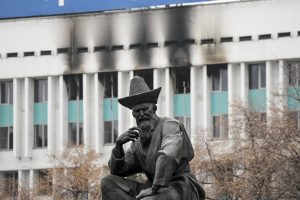Following local reporting of comments from Kazakhstan’s human rights ombudsman, Elvira Azimova, that 18 foreigners, including 14 Uzbek citizens, remained in Kazakh custody after being detained during the unrest in early January, Uzbek authorities have asked Kazakh authorities for more information.
On February 22, a spokesman for the Uzbek Ministry of Foreign Affairs said in a statement that it had requested full information about Uzbek citizens arrested, including their current location and the relevant charges. The Uzbek side also requested that Kazakh authorities “organize meetings of the detained Uzbek citizens with officials of Uzbekistan’s diplomatic missions and consulates.”
This follows a February 10 note sent by the Uzbek consul general in Almaty to Kazakh authorities regarding the ongoing detention of Saken Talipov, a 17-year-old Uzbek citizen whose mother is a naturalized Kazakh citizen living in Almaty. Uzbek authorities did not share specifics about the note, but confirmed one had been sent. According to RFE/RL’s reporting, Talipov arrived in Almaty in the fall of 2021 and his family said he went to the square on January 4 with acquaintances. The boy’s mother, Kamshat Derbisaliyeva, says her son has been charged with “participating in riots” and threatening a law enforcement officer. RFE/RL also reported that following her speaking out about her son’s detention, Derbisaliyeva was fired by her employer.
With the most recent note, Uzbek authorities are further publicizing their efforts on behalf of the detained Uzbeks. The contents of the statement suggest that Uzbek authorities may not have complete information about the reported 14 detained Uzbek citizens and may not have full access to them. Without names and access, it is all but impossible to disprove their involvement.
Uzbek authorities have cause to be concerned about the treatment of their citizens in custody.
This week, as Eurasianet’s Almaz Kumenov reported, Kazakh prosecutors said that at least six people died in custody as a result of torture. Authorities say such abuses are not widespread, but there have been a significant number of allegations. Azimova, whose full title is state commissioner for human rights, said in a February 22 statement that the anti-corruption agency and special prosecutors were investigating 191 cases of “unlawful methods of investigations and violation of human rights.”
Kazakh authorities have consistently pointed the finger at “foreign-trained” terrorists as responsible for the chaos in early January, despite a lack of evidence. Kazakh President Kassym-Jomart Tokayev wildly claimed that “20,000” terrorists and bandits were responsible, having been trained by a “single center.” Kazakh authorities have never stipulated where these alleged foreign-trained terrorists came from but sustaining that narrative requires holding some foreigners accountable.
Most absurd was the arrest during the unrest of a Kyrgyz musician, who was subsequently paraded, with a bruised face, on TV and confessed to taking money to come to Kazakhstan. The man, Vikram Ruzakhunov, was swiftly recognized and eventually released, but it was only after he’d been returned to Kyrgyzstan and a month went by that he finally began to discuss the torture he’d been subjected to. In an Instagram post in mid-February, he thanked “the person who, out of hundreds of unreasonably detained, innocent, chose me, made me memorize the script and retell it to the camera” because had he not been recognized he may never have been released. He also said that his initial statements upon being released, that he was not tortured by the Kazakh authorities, were made in an effort to not worsen the circumstances of those still detained. Ruzakhunov claimed to have had his ribs broken and a damaged lung as a result of the torture. Another Kyrgyz citizen, Cholponbek Sydykov, was eventually returned to Kyrgyzstan with a concussion, both shins broken and several broken ribs.
And so, Uzbek authorities are not unreasonable in their concerns for the wellbeing of their citizens in Kazakh detention. Fourteen of the 18 reported foreigners detained in Kazakhstan over the January unrest are Uzbek citizens, two are Kyrgyz and two are Russian citizens. Thousands were detained in January. Although most have been released, hundreds are facing various charges. Some convictions and sentences have already started to come through. With the bulk of those arrested and charged Kazakh citizens, one wonders where the 20,000 terrorists have gone?

































